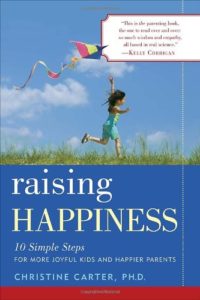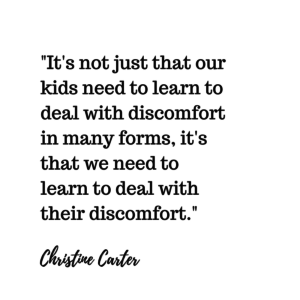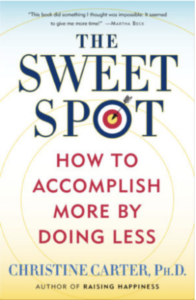Jun 15, 2018

Part of helping kids learn to deal with discomfort is learning how to be uncomfortable ourselves.
In Episode 41, I'm talking with my friend and favorite happiness guru, Christine Carter, Ph.D. I have been a fan of Christine's research, writing, and speaking since 2011, when I recruited her to start doing staff trainings at my camp.
Christine was my first podcast guest back in Episode 1 and has been instrumental in helping me stay up-to-date on the research about trends affecting the well-being of children, teens, and adults.
 Christine is
the author of The Sweet Spot: How to Achieve
More by Doing Less (2017) and Raising Happiness: 10 Simple
Steps for More Joyful Kids and Happier Parents (2011). She
is a sociologist and Senior Fellow at UC Berkeley’s Greater Good Science Center, where she
draws on scientific research to help people lead their most
courageous, joyful, meaningful, and authentic lives.
Christine is
the author of The Sweet Spot: How to Achieve
More by Doing Less (2017) and Raising Happiness: 10 Simple
Steps for More Joyful Kids and Happier Parents (2011). She
is a sociologist and Senior Fellow at UC Berkeley’s Greater Good Science Center, where she
draws on scientific research to help people lead their most
courageous, joyful, meaningful, and authentic lives.
The working title of the book she is currently researching and writing, about what teens need for their well-being, is How to Make or Break an American Teenager (2019). In this episode, we talk about her research so far on raising "iGen" kids (born 1995 or later). We talk about the mental health challenges teens are facing, how we all need to learn to be uncomfortable, and how she manages screen time with her teens.
Quotes
 "We have become a nation built on
comfort."
"We have become a nation built on
comfort."
"This generation is really, really different. One quarter of them have made a plan to kill themselves... This is the most anxious, most depressed generation we've ever seen...We are on the verge of a very serious mental health crisis."
"It's so counterintuitive for most parents, right? We want to protect them. We don't want them to feel uncomfortable. We don't want them to be in pain. We don't want them to fail. We don't want them to be disappointed."
"It's not just that our kids need to learn to deal with discomfort in many forms, it's that we need to learn to deal with their discomfort."
"There's so much that's so good about the technological innovations...We haven't adapted properly to all the new technology."
"This is why camp is so important. It's actually an adaption. It's a hold-over from before... Now it's a way to cope with the massive amount of information and stuff."
"It's shaping them developmentally."
"This is the first generation of kids that really feels entitled
to a life free from pain. And so if they're uncomfortable in any
way, or disappointed, it's somebody else's fault."
Links
Related
